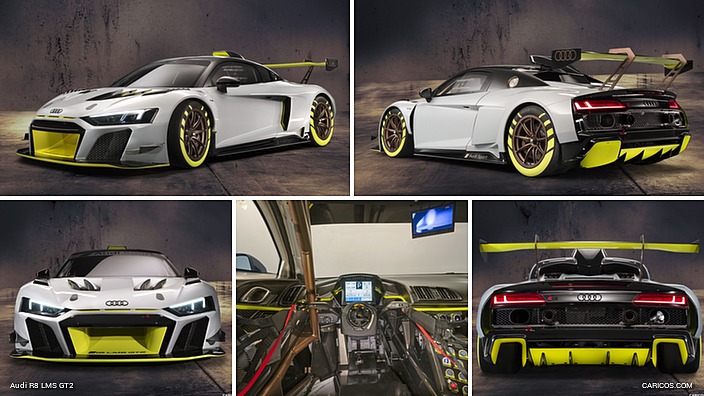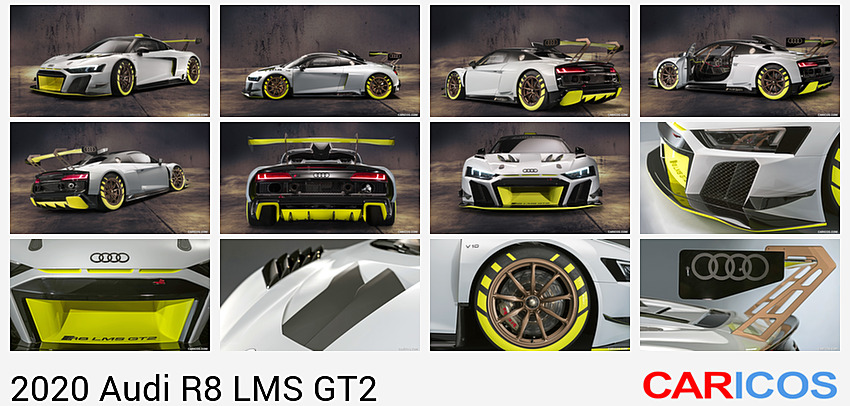2020 Audi R8 LMS GT2
- Fourth model from Audi Sport customer racing unveiled in front of large audience
- Most powerful customer racing car with 470 kW (640 hp)
Audi is ready for a new category in motor racing: The Audi R8 LMS GT2 stands for several superlative features in Audi Sport customer racing’s program. With 470 kW (640 hp), it is by far the most powerful sports car in the eleven-year history of the customer racing program. The race car achieves its specific power output of 123 horsepower/per liter of displacement with a near-production-level 5.2-liter naturally aspirated V10 engine. With it, the weight-to-power ratio of the Audi R8 LMS GT2 amounts to some 2.1 kg/hp. From a historical perspective, in about four decades, there has never been an Audi Sport race car with a naturally aspirated engine with such a favorable ratio between homologation weight and engine power.
Finally free: Audi Sport delivers the fascinating V10 engine in the GT2 model in a way that allows it to naturally aspirate air totally unrestricted also in racing and thus achieves its so far highest power output. Stéphane Ratel Organisation (SRO), which is responsible for the current GT2 regulations, gives center stage to the weight-to-power ratio as a leveling factor. Thus, with some 2.1 kg/hp, a balance is to be created between GT2 race cars using naturally aspirated engines and nominally clearly more powerful models with turbocharged engines.
This idea aims to close a gap in international GT racing. Audi Sport customer racing has been present in GT3 racing with the R8 LMS since as far back as 2009 and in the GT4 entry-level category since 2018. With very high aerodynamic downforce and ample pedigreed racing technology, the GT3 model, in terms of expense, setup and vehicle control, tends to address pros. The GT4 category offers young drivers being promoted from lower categories, as well as amateurs and gentlemen, a GT race car that is easy to control and very economical in terms of purchasing costs. While the GT2 race car outperforms both models with regard to engine power and top speed, its concept is designed to be nearly as fast as a GT3 when it comes to lap times. Hence its high longitudinal dynamics with limited lateral acceleration primarily addresses gentlemen drivers. This is precisely the target group for which the new GT2 class has been created.
 2020 Audi R8 LMS GT2
2020 Audi R8 LMS GT2
In terms of technology, the Audi R8 LMS GT2 is based on the production version. The Audi Space Frame (ASF) with its intelligent material mix of aluminum and CFRP forms the basic structure of the race car, while a steel roll cage provides the required safety in racing. The geometry of the chassis corresponds to the Spyder version, just like the door cut-out. The extruded profiles in the roof area have been adopted from the Coupé. The cockpit section is completed by a slim-tailored hard top that gives the bodywork a unique, lean-sculptured look. Like the other body parts, it is made of CFRP for weight reasons. The cage consisting of tubes that, compared to the GT4 model, have a lower wall thickness but high strength due to higher-grade steel, additionally reduces mass. With a dry weight of 1,350 kilograms, the Audi R8 LMS GT2 tips the scales at 100 kilograms less than, for instance, the GT4 version.
Aerodynamically, the GT2 race car clearly differs from its siblings. Healthy temperature management of the engine is guaranteed by the voluminous radiator at the front end with CFD-optimized air flow channels. Unlike the GT3 and GT4, the vents are on the right and left, causing the air to flow past the windshield in order to avoid thermal conflicts with the engine’s air intake on the roof. The sideblades in front of the rear wheels follow the form prescribed by the R8 Spyder. However, they expose a larger cross section for air intake. A new front splitter, CFRP underfloor sections and a rear diffusor featuring the well-known GT4 geometry, but made of CFRP in the GT2 model, channel the air underneath the race car. The innovative rear suspension of the rear wing enhances air flow to the car and generates further downforce on the rear axle.
The wheel suspension with double wishbones front and rear as a pure racing suspension has been redesigned for weight reasons. Audi Sport combines new hub carriers and wishbones with the brake calipers of the GT3 version on the front axle and the GT4 brake calipers on the rear axle. The suspension struts have been adopted from the same modular kit as their counterparts for GT3 and GT4. In the steering system with its electrohydraulic servo pump, Audi uses synergies from the GT4 modular kit.
Audi Sport has upgraded the electronic architecture including the Anti-Lock Braking System (ABS), Traction Control (ASR) and the Electronic Stability Program (ESP) versus the GT4 model. New software enables a four-level adjustment of the systems and is in line with the needs of the field of application.
Like the power-plants of the GT3 and GT4 models, the naturally aspirated V10 engine originates from production at the Győr site in Hungary. The engineers essentially achieve the higher output of the 5.2-liter engine to 470 kW (640 hp) by means of modified engine management software and the conspicuous air intake plenum above the roof. It guarantees a ram-air intake effect with measurably increased power output. Strictly in technical terms, the GT3 unit with up to 430 kW (585 hp) has been the most powerful engine in Audi Sport’s model range up to now. However, due to regulatory restrictions, this GT3 engine is only allowed to mobilize about 368 kW (500 hp). So, factually, the Audi R8 LMS GT2 puts some 28 percent more power on the tarmac. Audi combines the GT2 engine with the S tronic seven-speed double clutch transmission which the driver operates by means of paddle shifters in the steering wheel. It has been used with great success in GT4 racing in sprint and endurance events.
In terms of safety, the Audi R8 LMS GT2 is top-class too. The Audi Protection Seat PS 3 optimally surrounds and supports the driver, while safety nets on the sides provide another increase in protection. The fire extinguishing system and six-point harnesses satisfy the high FIA standards. The safety fuel cell matches the design in the GT4 model, but has a 15-liter catch tank with a fill level sensor. A quick-refueling valve for endurance events can be ordered as an option. The safety steering column is adjustable in height and length and the pedals with their quick-adjustment mechanism sit on rails. Consequently, a precise seating position can be individually set for any physique. The rescue hatch in the roof facilitates access for the extrication team in the event of an accident. In this way, it makes it possible to remove the helmet of the driver in need of help and to apply a Kendrick Extrication Device for stabilization. The windshield and the side windows are made of lightweight and strong Makrolon. The camera-based digital rear-view mirror is new because the race car has no rear window due to the voluminous intake system. The construction of the doors is new too. They are made of carbon fiber and together with the CFRP-AFRP side impact protection with aluminum honeycomb that has been mandatory since 2019 satisfy the latest safety requirements for side impact protection.
This comprehensive package of power and performance, fascination and safety predestines the Audi R8 LMS GT2 as an ideal race car for gentlemen drivers and automobile enthusiasts who would like to call a future collector’s item their own.










